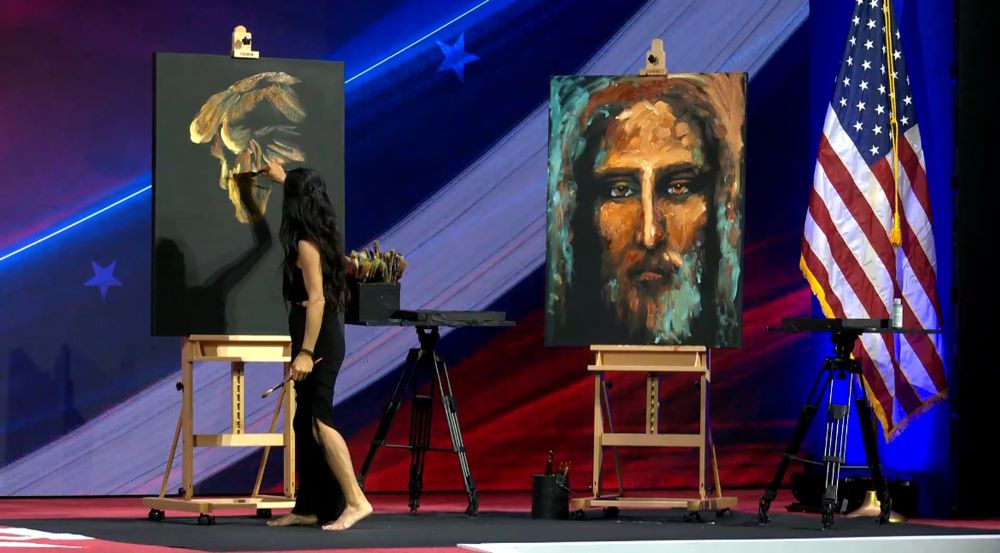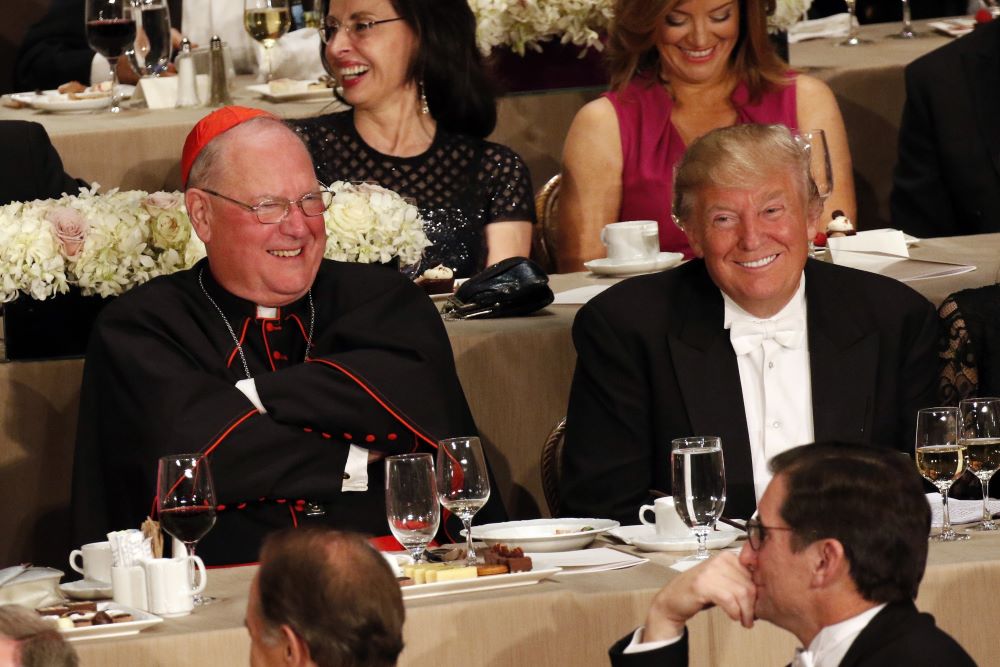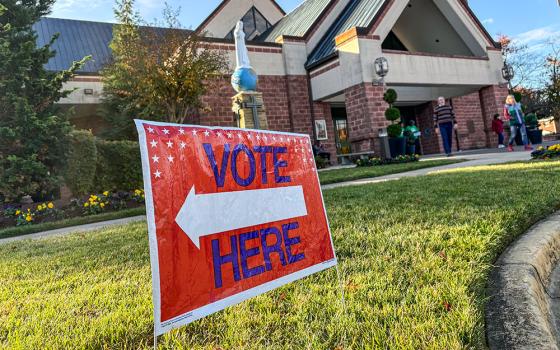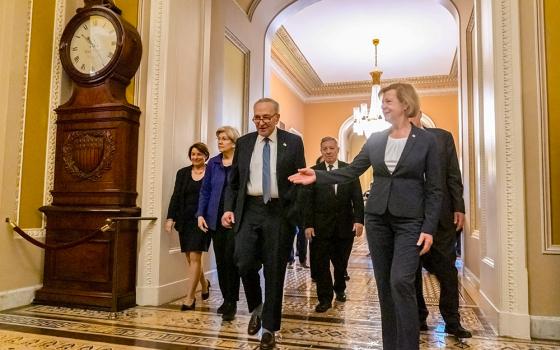
An artist on stage painted an image of former president Donald Trump and an image of the face of Christ, before the Conservative Political Action Conference's annual Ronald Reagan Dinner, Feb. 23. Former Tyler, Texas, Bishop Joseph Strickland was the dinner's keynote speaker. (OSV News/Screen grab CPAC)
During this election year, a growing number of Catholic priests and bishops are talking politics from the pulpit, blurring the lines between church and state. Despite claims of neutrality and nonpartisanship, too often priests and Catholic leaders are repeating culture war and even Christian nationalist talking points from the Trump campaign — and sometimes tiptoeing right up to the line of actually supporting Donald Trump.
It is a reminder of past electoral behavior from Catholic leaders such as Cardinal Timothy Dolan and former Tyler, Texas, Bishop Joseph Strickland, who both used their positions of authority to essentially campaign for Trump in 2020.
The contentious behavior exhibited by some bishops is merely the tip of the iceberg. It's indicative of a deeper problem that extends beyond political differences. The alignment of certain U.S. bishops with Christian nationalist political figures whose actions are at odds with Catholic values is contributing to the growing divide within the church.
While bishops can't legally invoke their official role or the church to endorse a candidate, more than a few of them have come as close to crossing that line as possible. As an example, in April at a vigil talk on Christian forgiveness following a celebration of daily Mass, Bishop Robert Gruss of Saginaw, Michigan, called President Joe Biden a "stupid" Catholic.
While bishops can't legally invoke their official role or the church to endorse a candidate, more than a few of them have come as close to crossing that line as possible.
It is the crest of hypocrisy for a Catholic bishop or priest to attack not just the president but anyone inside a Catholic Church at a vigil on forgiveness. As Catholics/Christians we know that hypocrisy is the sin most frequently mentioned in our sacred Scriptures.
Incidents like these have sparked a significant reaction from grassroots Catholics nationwide. Nearly 29,000 Catholics and ecumenical allies have signed a petition from Faithful America, for whom I serve as a Catholic campaign representative, urging members of the U.S. bishops' conference to refrain from involvement in the 2024 election and to withhold support for Trump.
However, when responding to the petition in Newsweek, the U.S. bishops' conference denied any involvement in guiding voters or endorsing political candidates, saying, "The Catholic Church doesn't tell the laity to vote for any particular candidate or political party."
This is tone-deaf at best, and partisan and manipulative at worst. Contrary to the bishops' conference's claims, stories involving bishops Dolan and Strickland demonstrate the active influence some bishops exert on their congregations. In fact, a Strickland-supported political organization just announced a new campaign to get parishes to hold Masses in support of Trump. Numerous petition signers also told Faithful America about times when their priests explicitly advised parishioners on how to vote, creating a rift within communities and prompting some to leave their churches.
A signer from Illinois commented, "We had a pastor at the Catholic Church who told people to vote for Trump ahead of his first election. When we came out of church, there were leaflets under our windshield wipers that said we must vote Trump. It drove us out of the parish and almost out of the Catholic faith."
The U.S. bishops' conference's close association with the Republican Party is a poorly kept secret, as evidenced by some clergy's treatment of President Joe Biden. Multiple bishops referred to the president as a fake Catholic and urged that he be denied Communion. Time and time again, the bishops' conference has used harsher language in its press releases to criticize both Biden and former President Barack Obama by name. They cited only "the administration" when disagreeing with Trump during his term in office.
Calls for an investigation into bishops' potential ties with hard-right organizations like Catholic Vote and right-wing judicial activist Leonard Leo raise even more questions about the pastoral priorities of the U.S. Catholic hierarchy.
The good news is, it is not all bishops. Prelates like Bishop John Stowe of the Lexington, Kentucky, Diocese, have criticized the Christian nationalist, un-Christlike actions of right-wing bishops, providing a ray of hope and a foundation for progress. We have seen this most recently in Stowe's wholehearted acceptance of Br. Christian Matson, a vowed transgender hermit in Stowe's diocese. And groups like Catholics Vote Common Good are mobilizing grassroots Catholics to build on the movement of a progressive church moving toward pastoral acceptance.

New York Cardinal Timothy Dolan and Donald Trump, then the GOP nominee for U.S. president, smile during the 71st annual Alfred E. Smith Memorial Foundation Dinner at the Waldorf Astoria in New York City Oct. 20, 2016. (CNS/Gregory Shemitz)
Bishops can help rebuild trust and unity in the church. In a time of political and cultural discord, Catholics look to church leaders not for political advice but for spiritual guidance on upholding Gospel values of love, equality and dignity. Or as we have seen in Nazi Germany, the opposite can happen. In 2020 the German Catholic Bishops' Conference issued a letter of apology for the actions of Catholic bishops and priests in Germany leading up to the Holocaust. "German bishops, motivated by nationalism and anti-communist sentiment and a desire to preserve the church by avoiding confrontation with the Nazis, told their followers to support the regime during the war," the letter said.
Advertisement
If the bishops are serious about their mission and adhering to Pope Francis' pastoral vision of unity and equality, they must take steps to bridge this widening gap between the hierarchy and the Catholic faithful. To start undoing the harm of political partisanship and conflicts in parishes and communities, the bishops should consider the following:
- Set aside partisanship. The church must publicly distance itself from overt partisan affiliations, especially concerning authoritarian would-be dictators like Trump, whose actions conflict with core church values. This move is essential to maintain the church's moral authority and credibility.
- Update "Faithful Citizenship." The U.S. bishops' conference should revisit and update the election document "Forming Consciences for Faithful Citizenship," as Stowe has implored them to do, emphasizing issues central to Francis' vision and the daily lives of Catholics. Aligning the church's teachings with the concerns of its members is crucial for fostering a sense of community.
- Support the synodal process. The bishops should actively endorse and participate in the synodal process unfolding within the church, under Francis' direction. By encouraging open dialogue and engagement, they can ensure that the church's decisions reflect the collective wisdom and values of its diverse members.
In addressing these three areas, the bishops have an opportunity to lead the church toward a more inclusive and unified future, in line with the teachings of Francis and the broader Catholic tradition. The time has come for the church to prioritize its mission over partisan interests and work towards healing the divide within its own ranks.








